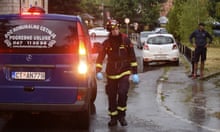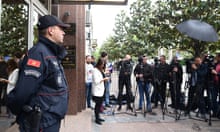Montenegro’s conservative pro-Serbian governing coalition collapsed on Friday amid internal disputes, after parliament backed a no-confidence motion tabled by a junior coalition partner.
Lawmakers voted 43-11 in favour of the motion against prime minister Zdravko Krivokapić’s government after weeks of political deadlock. Other lawmakers in the 81-seat parliament either abstained or left the session before the vote.
Krivokapić, a university professor who is close to the Serbian Orthodox Church, has headed an ideologically mixed coalition that included pro-Serbian groups – as well as smaller parties that are not happy with the pace of reforms needed for the small country’s bid to join the European Union.
Friday’s vote came less than two years after Krivokapić’s coalition came to power, replacing a long-ruling pro-western party.
Coalition partners were at odds over several issues, including the influence of Serbia’s populist administration and its church in Montenegro’s domestic affairs. Montenegrins remain deeply divided over whether to join the EU, or seek closer ties with neighbouring Serbia and its ally Russia.
Seeking to break the political stalemate, a junior partner in the government filed the no-confidence bid and proposed that a minority government be formed.
Montenegro, a small Balkan nation on the Adriatic Sea, is a member of Nato and has formally requested EU membership. The government deadlock has stalled political and economic reforms.
The country has long been plagued by disputes over identity, including clashes last year when protesters calling themselves “Montenegrin patriots” tried to prevent the inauguration of a new leader of the Serbian Orthodox Church in Montenegro.
It was not immediately clear whether or when a minority government could be formed, or whether the country would head into early elections. Either outcome would have the backing of the opposition Democratic Party of Socialists (DPS), which ruled Montenegro for 30 years before it was replaced by Krivokapić’s government after an August 2020 election.
Headed by Montenegrin president Milo Đjukanović, DPS led the nation of 620,000 to independence from Serbia in 2006 and defied Russia to join Nato in 2017. The party’s popularity plunged over time mainly because of alleged corruption and links with organised crime.
Pro-Serb lawmakers warned during Friday’s parliamentary debate that they would organise protests if the new majority cabinet was formed with DPS support.
“If you want to preserve the will [of the people], you must talk to us,” said Milan Knežević of the pro-Serb Democratic Front group, warning that it would stage protests and “’carry the flag of resistance”.








